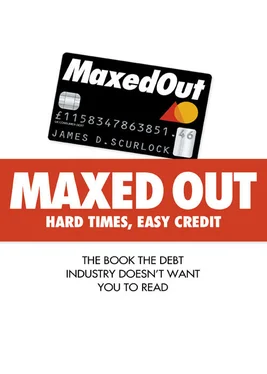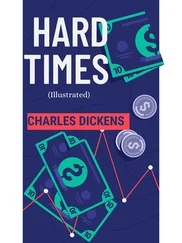The same gimmicks are now being applied to consumer debt. Most mortgages, car loans, and credit card debt are packaged and sold off to investors at a profit within a short period of time, sometimes seconds. Banks create an estimate of how much the credit card debt is worth and sell it to investors, pocketing a profit. There is no banker carefully tending to your mortgage or your credit card down at the local branch, any more than there is a record executive strolling down Broadway Street searching for the cowboy.
But there is an even greater misconception at work. A misconception that debt is not what it used to be. That there is “good” debt, for example, and “bad” debt. Tune in to Suze Orman, for example, and she will tell you that a single number, your credit score (aka, FICO), 6is the key to your financial future. But while a good credit score gets you better rates on your mortgage and credit cards, it also opens up the floodgates for more “good”—i.e., cheap—credit to pour into your life, and this credit does not usually remain good or cheap for too long. The idea that one should stay out of debt, period, is now considered unrealistic. After all, who lives without debt? The Unabomber, maybe?
Even more frightening is the notion that debt is our friend—a magical tool that allows us, in the words of Napster’s new ads, to “own everything and have nothing.” No less a fiscal conservative than President Bush has dismissed the federal debt as “numbers on paper.” His vice president has flatly stated, “Deficits don’t matter.” But the apathy prize goes to two-term Florida senator Connie Mack, who was hired to give Bush ideas on reforming the tax code in 2005. Here’s a recent exchange between the senator and the New York Times:
Interviewer: Where do you suggest we get the money from?
Sen. Mack: What money?
Interviewer: The money to run this country.
Sen. Mack: We’ll borrow it.
Interviewer: I never understand where this money comes from. When the president says we need another $200 billion for Katrina repairs, does he just go and borrow it from the Saudis?
Sen. Mack: In a sense, we do. Maybe the Chinese.
Twenty years ago, when the federal debt passed the trillion-dollar mark, politicians, including Ronald Reagan, as well as economists, including Alan Greenspan, warned of dire consequences. Seven trillion dollars later, borrowing more has become the solution to every conceivable problem. Take Social Security as the largest, and perhaps most insidious, example: In order to reduce deficits, the past four presidents have borrowed $1.5 trillion from Social Security and the “trust fund” now holds nothing more than a very big IOU. In effect, we’ve been surfing, borrowing from Social Security to pay off the interest on the federal debt every year. In the 2000 and 2004 elections, George W. Bush promoted an idea called “private accounts.” In theory, every American would own their Social Security account. The account would contain real money so it could buy real investments, i.e., not IOUs. In theory one could also borrow against it, of course. The trouble is that since the Social Security Trust Fund has no cash, no one can say where the money would come from to fund these accounts. The Chinese again? Probably. But Bush hasn’t told us yet. He has, however, loudly warned working Americans not to count on Social Security. (Note to cowboy: Keep strummin’.)
The media never really took the president to task on the math of private accounts. It was the AARP 7that killed the idea, and, ironically enough, they hated it because private accounts would have reduced the amount of guaranteed benefits to their members, not because it would have indebted their future members.
Pete Peterson, one of the smartest financiers among us, has correctly pointed out that “benefits” like personal accounts are simply deferred taxes if they’re not paid for. Yet neither the anti-tax president nor his adversaries once questioned whether borrowing the trillions of dollars needed to fund private accounts was a good idea, much less possible. After all, Americans have accepted the surfing lifestyle in all of its absurdities. We have watched advertisements that say “Pay off your high credit card debts!” and we have called the 800 numbers and attached our homes to new loans in order to pay off our credit cards, then bragged to our friends that we are “debt free.” We are encouraged to rent things we used to own—including music and, paradoxically, the down payments on our homes. We have accepted this new bargain that we will never be out of debt as inevitable, preordained by the God of our choosing. We have forgotten the feeling of solid ground as we have taken on larger and more treacherous waves. We have ignored the greatest investor among us, Warren Buffett, who has derided our “sharecroppers society.” He sounds old, cranky, and un-hip.
Until we wipe out. Until we lose our jobs, until we get divorced, until we discover that our health insurance doesn’t cover thousands of dollars of “extras,” or until our home doesn’t appreciate at the anticipated rate. Until we can no longer surf. And then the “debt hell,” as a consumer advocate I interviewed calls it, kicks in. The fees pile up. The interest rates increase. The bargain we accepted ceases to be a bargain. It becomes prohibitively expensive. We learn that we are not middle-class at all. We are poor. We own nothing.
And then, just maybe, we finally ask, “Well, how did we get here?”
1Number one is Utah.
2The chain finally began accepting credit cards in February 2005. Et tu, Waffle House?
3Trent Lott, the former Senate majority leader, is among those suing the insurers.
4In the UK, a similar picture exists. Collectively, Britons owe 140 percent of their post-tax income – the average household is in debt to the tune of more than £8,000 excluding mortgages. Total debt in the UK is rising by £1m every four minutes.
5Ironically, mark-to-market was developed to prevent companies from hiding losses by compelling them to adjust their portfolios to market prices on a daily basis.
6Short for Fair Isaac Corporation.
7The American Association of Retired Persons, which offers a wide range of special products and services to the over-50s and is the largest lobbying group for seniors in Washington DC.
Конец ознакомительного фрагмента.
Текст предоставлен ООО «ЛитРес».
Прочитайте эту книгу целиком, купив полную легальную версию на ЛитРес.
Безопасно оплатить книгу можно банковской картой Visa, MasterCard, Maestro, со счета мобильного телефона, с платежного терминала, в салоне МТС или Связной, через PayPal, WebMoney, Яндекс.Деньги, QIWI Кошелек, бонусными картами или другим удобным Вам способом.











